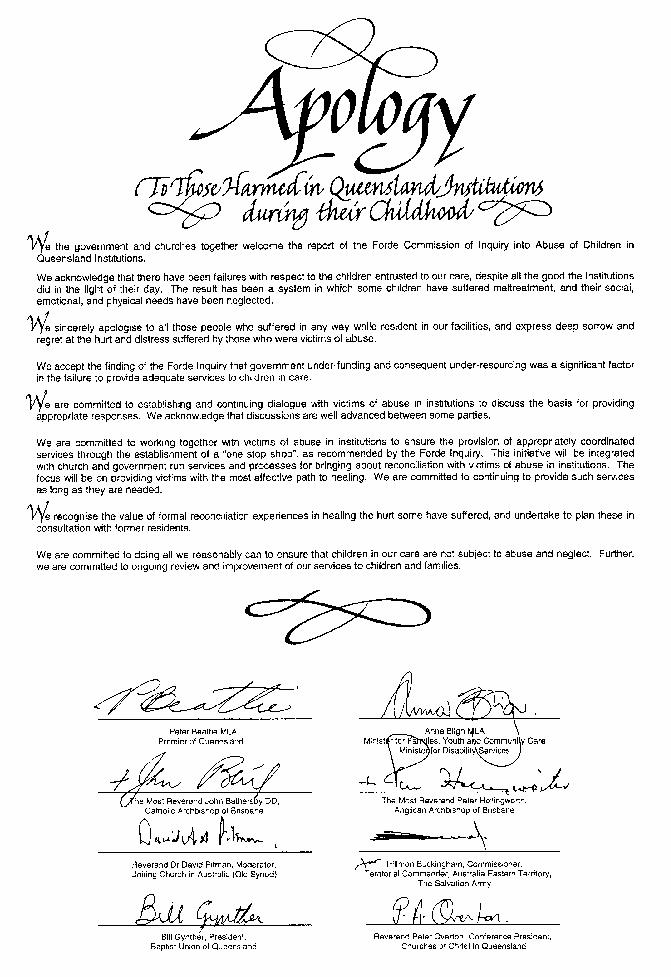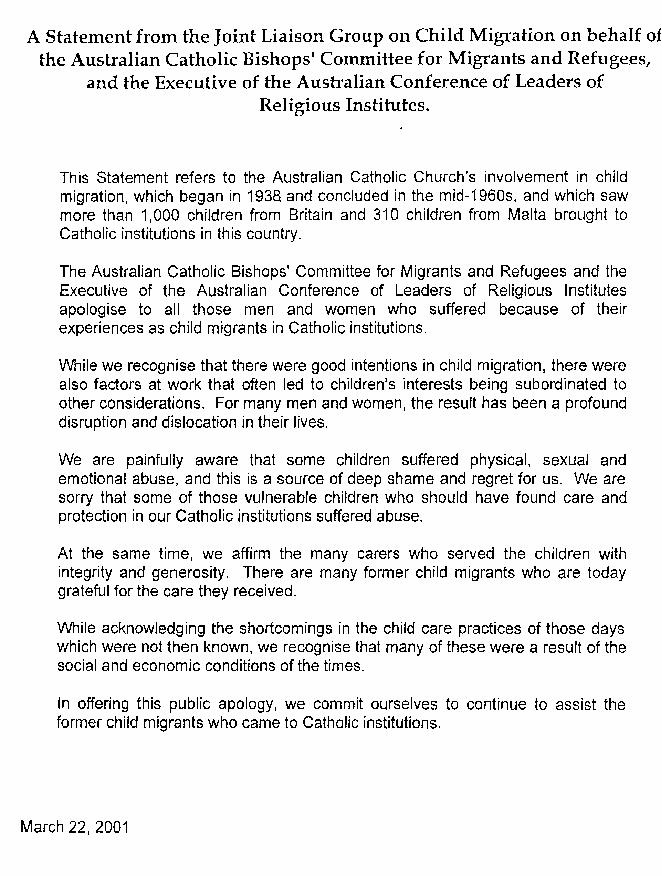Appendix 7
Text of apologies
This Appendix contains the statements of
acknowledgment and apology referred to in chapter 10 from the following:
-
Congregation of Christian Brothers of Western
Australia, July 1993;
-
Queensland Government and Churches, August 1999;
-
Government of South Australia, 23 February 2001; and
-
Catholic Church’s Joint Liaison Group on Child
Migration, 22 March 2001.
|
THE
CHRISTIAN BROTHERS CHILD CARE INSTITUTIONS
|
Clontarf (1901-1983),
Castledare (1929-1983), Tardun (1928-1965)
Bindoon
(1936-1967)
A Statement by the Congregation
of Christian Brothers of W.A.
In recent years, controversy has arisen over the treatment of children
resident in the W.A. child-care institutions at Clontarf, Castledare, Tardun
and Bindoon, especially during the 1940s and 1950s.
Some former students have made serious allegations of ill-treatment and
abuse.
Other students of the same era claim such allegations are grossly
exaggerated and are not representative of life in these institutions.
The following statement from
the Congregation of Christian Brothers in W.A. seeks to put the events and
circumstances of that time into proper context so that fair judgement can be
made and to establish a basis for reconciliation with those who have been
aggrieved.
We have studied the allegations available to us, and we have made our
own independent inquiries. The evidence is such as to convince us that abuses
did take place, abuses that in some cases went well beyond the tough conditions
and treatment that were part of life in such institutions in those days.
While the extent of the abuse appears to have been exaggerated in some
quarters, the fact that such physical and sexual abuse took place at all in
some of our institutions cannot be excused and is for us a source of deep shame
and regret. Such abuse violates the child’s dignity and sense of self-worth. It
causes psychological and social trauma that can lead to lasting wounds of
guilt, shame, insecurity and problems in relationships.
We, the Christian Brothers of today, therefore unreservedly apologise
to those individuals who were victims of abuse in these institutions.
We do not condone in any way the behaviour of individual Brothers who
mAy have perpetrated such abuse.
In apologising, however, we entreat people not to reflect adversely on
the majority of Brothers and their co-workers of the era who went about their
work with integrity and deep regard for the children entrusted to their care.
Their work and dedication are reflected in the numerous students who,
despite deprived backgrounds, went on to take their places as successful
members of Australian society. We are deeply grateful for the very many
expressions of thanks and support we have had from former students.
Between 1901 and 1983 some 4,000 boys, mostly orphans, child migrants
and State wards, were cared for in Christian Brother institutions in W.A.
Most of the children who came to these institutions were from deprived
backgrounds. Many were child migrants from the U.K. and Ireland, brought to
Australia in a scheme initiated by the Commonwealth Government and with which
several voluntary organisations, including the Australian Catholic Church,
actively co-operated.
Conditions were tough, unnecessarily so by today’s standards, but quite
common in child-care institutions in those days. Resources were scarce,
Government assistance was minimal, personnel were untrained in child-care and
were often overworked, and specialist help was almost unknown.
For some boys their time in these centres provided them with the care,
education and training which gave them their opportunity to make their way in
life; for others it was an unhappy and hurtful experience.
We acknowledge the shortcomings in the child-care practices of those
days and deeply regret the hurt that some children suffered, and whatever
long-term suffering that may be attributable to their experience in these
institutions.
We reject, however, the implication sometimes made that the later
suffering or difficulties of some former residents can be blamed entirely on
the time spent in our institutions.
Many factors can adversely affect the way people’s lives turn out, and
the boys concerned suffered more than their fair share before and after their
time in our institutions, e.g.
-
Experiencing
little or nothing of ordinary family life and spending formative years in
child-care institutions;
-
Experiencing the
turmoil and deprivation of war and its aftermath in Britain and Europe; and
-
Meeting later
hardships and disappointments as young adults trying to find their place in
society.
Is it any wonder that such circumstances affected many of them for the
rest of their lives?
Indeed, the courage and resourcefulness shown by many of them in the
face of childhood deprivation must command our respect and admiration.
We cannot and do not excuse any abuse that took place in our
institutions nor do we wish to minimise in any way the damage caused.
However, for those looking to apportion blame for such incidents the
following must be borne in mind:
-
The events took
place mostly 30 to 50 years ago and many of the people named as accused,
victims or witnesses, are dead or unable to be contacted. While the passage of
time does not diminish the seriousness of the incidents, it does make it
extremely difficult to uncover the full truth; and
-
Regular
inspections were made of these institutions by the Government agencies who had
ultimate responsibility for the welfare of the children. There is no indication
of generalised abuse in their reports.
We cannot change the past. We cannot take away the
hurt. We can express our heartfelt regret for the failings of the past and we
can, on behalf of our predecessors, beg the forgiveness of those who suffered.
Also, we can offer practical assistance to those who
need it. To this end we are considering practical ways of offering assistance
of offering assistance to those who are now suffering. To those who were
adversely affected, we give our sincere commitment that we will do all that
reasonably can be done to ease your pain by helping you with your present day
needs.
We hope that a spirit of cooperation and
reconciliation will mark our efforts to find mutually acceptable solutions to
present problems.
We continue to welcome approaches from former
residents of our child-care institutions who wish to share with us their
concerns. Some may wish to speak to Br Pat O’Doherty on (09) 458 9693 (after
hours); others may wish to contact one of the Brothers at our Province office
on (09) 450 5311; others may prefer to contact Sister Tanya at Catholic
Migration on (09) 221 1727.
Br Gerald Faulkner
On behalf of the
Congregation of Christian Brothers
Perth W.A.

Extract from the Speech by the Hon Dean Brown
MP for the unveiling of the British Child Migrant Plaque at the South
Australian Migration Museum
Friday,
23 February 2001
Official
Acknowledgment
Many of the former child migrants tell us that they suffered greatly as
a result of their being sent to Australia.
Many have told of experiences of physical, emotional and sexual abuse
at the hands of people in whose care they were placed.
Many say they were told that they were orphans.
Many say they were launched into adulthood without formal documents,
such as birth certificates or citizenship papers and without any idea of their
heritage.
The resultant pain for the former child migrants is said to be enormous
and has posed life-long challenges to them and their children and loved ones.
The Government of SA wishes to acknowledge that these experiences,
though not intended by the schemes, may have occurred and been suffered by the
child migrants.
At the same time, many of the former child migrants made an enormous
contribution to the State of South Australia and have since demonstrated
enormous courage and faith as they have worked to put the past behind them and
move into a future with hope and optimism.
We trust that the Government can move positively into the future with
them and play a role in assisting and supporting the former child migrants and
improving services for them.
